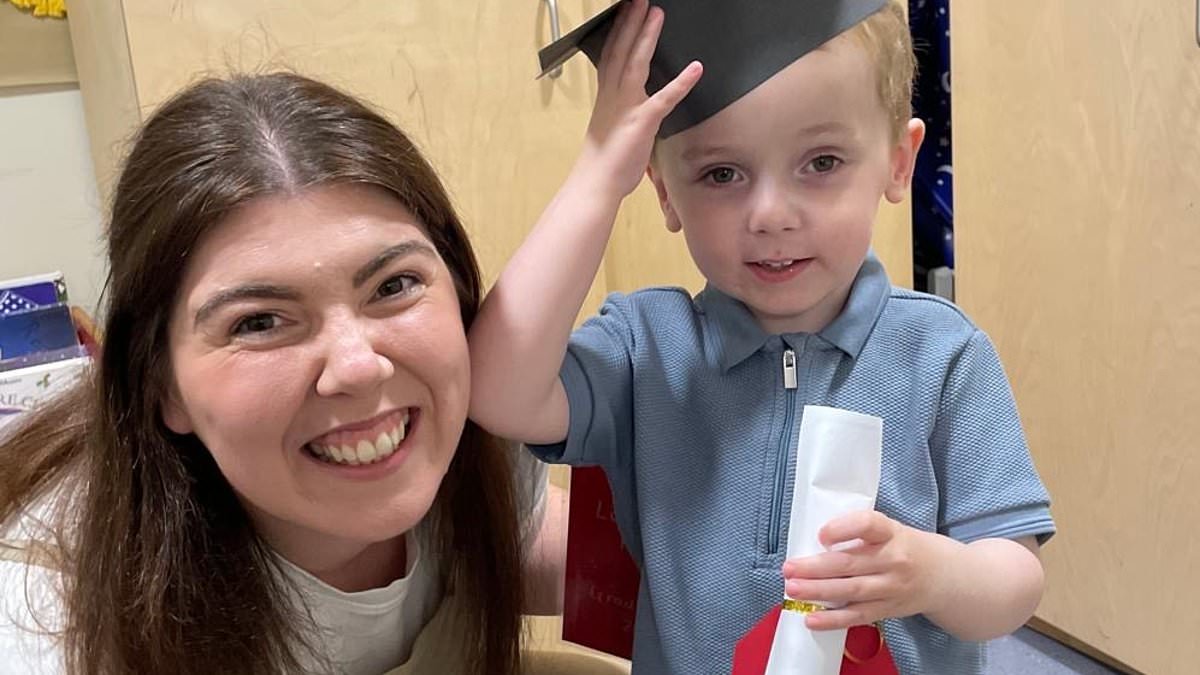A toddler with a one-in-a-million vein condition was saved in a world-first operation after a doctor remarked on his unusually shaped head.
Conor O’Rourke, now three, was diagnosed with vein of galen malformation, which affects ten to 12 babies a year in the UK.
It causes the veins and arteries in the brain to connect abnormally, increasing blood flow and leading to severe complications if undetected.
However, the usual treatment did not work – prompting surgeons to attempt a novel ‘high risk’ open procedure through the skull.
Connor was struggling with his development, limping when he walked and would have deteriorated neurologically over a year or two without the operation.
But medics say he is now considered ’99 per cent cured’, his problems have ‘reversed’ and he has become a ‘different child’.
Lucy O’Rourke, 36, from Bolton, said her son’s condition was only diagnosed when she took him to a doctor about an unrelated potential hernia aged eight or nine months.
She said: ‘The doctor was looking at his his belly button, and then suddenly wanted to ask me questions about his head.
‘And obviously I was slightly confused at that point.
‘I didn’t really know what the issue was, I’m just looking at my beautiful baby, and didn’t think that there was an issue.’
Mrs O’Rourke said the consultant asked about the shape of her son’s head, adding: ‘He felt like he had quite a pronounced forehead; it was quite a large head.
‘And he had very visible veins on his forehead, and his temples, round his eyes.
‘And we had seen those things, but obviously we didn’t in a million years think that there was something sinister going on.
‘We thought he was very fair skinned, and that was why we could see his veins.’
Mrs O’Rourke said that at the time of the appointment, Conor had not yet sat up on his own but had met all his other milestones.
She was warned to take her son to A&E if he suddenly started vomiting or was difficult to rouse after sleeping, although she was reassured it was probably nothing to worry about.
However, Mrs O’Rourke said the conversation played on her mind, and she called her GP the following day.
Conor was sent for an MRI in March 2023 and the couple were not worried until they were called into a family room.
At that stage, doctors did not know what was wrong with Conor but told the family he had a ‘significant brain issue’ that would require surgery.
The results were assessed by specialists at another hospital, with more scans ordered for Conor.
‘It was only after those scans that they said to us that they think that it’s vein of galen malformation and then started to explain to us a little bit what that meant,’ Mrs O’Rourke said.
‘But in reality, they’d never seen it before in Bolton.’
Mrs O’Rourke said the experience was ‘a living nightmare’ and her and her husband Sean O’Rourke, 38 felt ‘helpless’.
Conor was sent to Alder Hey Children’s Hospital in Liverpool and had three operations called endovascular embolisations, which involves inserting a small, flexible tube called a catheter into the arteries, usually from the groin.
Medics use X-ray imaging to guide the tube through the body and into place, and then inject a glue-like substance to block off the artery.
In some cases, the same procedure can be performed by inserting the catheter into the veins.
However, Conor is one of a rare subgroup of patients where veins block off and doctors can no longer get to the malformation.
When this happens, the jugular veins – a set of major blood vessels in the neck – also block off, causing the veins from the brain to try and drain elsewhere.
According to the toddler’s surgeon, Conor Mallucci, this was causing swelling and damage to the toddler’s brain stem and spinal cord, leading to him to deteriorate.
Mr Mallucci said: ‘It’s a fight against time, and that happened quite early in Conor, which is why we had to come up with this alternative route.’
The operation involved accessing the malformation through Conor’s skull to target the affected blood vessels.
Conor recently graduated from nursery and will be attending pre-school with his peers in September.
Mrs O’Rourke said she is ‘so proud’ of her ‘resilient’ son.
Mr O’Rourke has also committed to running the Manchester Marathon next April to raise money for Alder Hey.
‘Thank you just doesn’t cut it,’ Mrs O’Rourke said. ‘They not only saved his life, they saved ours too.’
